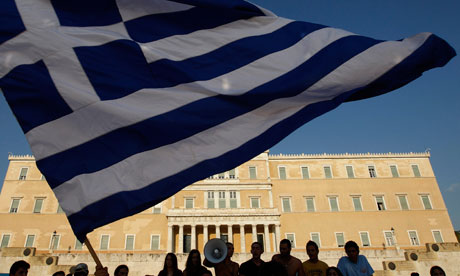Vicky Pryce The Observer, Sunday 13 May 2012
Reinstating the drachma is not in the interests of the Greek electorate or the rest of the eurozone
Protesters raise a Greek flag in front of parliament during a rally last year. Nearly 70% of Greeks want to stay in the eurozone – a fact reflected at the polls in the election earlier this month despite no single party winning a majority. Photograph: John Kolesidis/Reuters
Far from revealing that Greeks want to exit the euro, the election results send out a clear signal that the policy framework imposed since the crisis began has been wrong and needs to be rethought.
The majority of the electorate supported parties that would prefer to keep Greece in Europe, while delivering a strong rebuke to the two traditional parties of government, New Democracy and Pasok, for having brought Greece to bankruptcy and then being associated with the "austerity memorandum" – the terms of the troika bailout packages.
Opinion polls show that 70% of Greeks want to remain part of the eurozone. Only the parties of the extreme left and right want it to exit. Four-fifths voted for parties that would prefer to keep Greece in, although their views on the price to be paid to achieve that goal differ.
It is not in the interests of either Greece or the rest of the eurozone to reinstate the drachma. An exit from the euro would lead to a run on the banks and the collapse of the Greek banking system. If Greece was shut out of international money markets, the temptation would be to meet the government deficit through printing money, leading to rapid inflation. People's savings would be wiped out. And an effective devaluation might do little for Greece's balance of payments anyway, except possibly through tourism. Poverty would become increasingly widespread.
A Greek exit would also damage Europe's fragile growth prospects. The "contagion" everybody has been warning about would get worse because Greece would not leave the euro without also walking away from its debt obligations. Banks exposed to Greece would suffer massive losses and the potential damage to the trust that the banking system relies on could lead to another credit crunch. The markets would then focus on the next country likely to go down the same route and make it prohibitively expensive for it to borrow. This would add to the pressures already faced by other euro members. Ultimately, the UK would suffer as the eurozone is its largest export market.
So Greece leaving the euro is not the solution. The reality is that the costs of a Greek exit are higher than those of keeping it in the euro. In addition, I doubt Angela Merkel or any other European leader wants to be held responsible for forcing a Greek exit and the end of the euro as a political project. So a compromise is likely. Further write-offs will have to be made as Greece's debt level is unsustainable for a country in recession for the fifth year running. More European money to stimulate growth and jobs will have to come in the form of structural funds or special infrastructure bonds.
But a new government in Greece will, in exchange, have to commit to shrinking its bureaucratic state sector, open up its markets, eliminate corruption and reform its antiquated labour laws. This has been resisted until now but the prospect of renewed growth might be enough to persuade it to back reform. And the Greek people have shown through their votes that they no longer want to live in a country run for the interests of a small political and economic elite to the detriment of its long term prosperity.
Vicky Pryce is a Greek-born City economist and former joint head of the UK Government Economic Service
![The [Greek] European Tragedy](https://blogger.googleusercontent.com/img/b/R29vZ2xl/AVvXsEiWKI5s90SFm1wWTk6bs4p7CgslaC2SnYPsrZhb-B-smOufNNCSxCvpBLI9hOB-LsXZjir_PNmEiMk2-E62F3xkg96IoC6QFAaZAnPRTVH340IN9WBRmWJqPkjWlgyRj3zpALp7h6hvA58/s920/GkBack_new.jpg)

